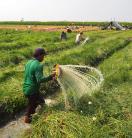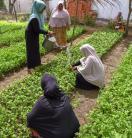Soil health focus to boost Indonesia’s vegetable crops
Ahead of World Soil Day (5 December) ACIAR is celebrating a new project that seeks to help Indonesian farmers boost production of shallots and chillies in a sustainable and safe way.
Understanding how local farmers manage their farming systems, including soils, and possible improvements are at the core of this ACIAR-funded project.
Dr James Quilty, ACIAR Research Program Manager for Soil and Land Management, said shallots and chillies were central to Indonesian cuisine and further developing them within rice cropping systems could boost livelihoods.
Project Leader Dr Stephen Harper, The University of Queensland, added it was important to help farmers diversify from rice-only systems because rice profitability has dropped substantially in the past 30 years.
‘Vegetable cropping in the coastal zones offers the best opportunity for reducing rural poverty,’ Dr Harper said.
‘But there are many constraints: degraded soils, changing and variable climate, plant disease, poor agronomic management, and excessive inputs of pesticides and fertilisers.’
This projects builds on the learnings of a seven-year ACIAR funded project into sustainable productivity improvements in vegetable crops in Indonesia and sub-tropical Australia.
The new project addresses key issues and challenges associated with the safe, sustainable production and intensification of shallot and chilli in the sensitive coastal agro-ecosystems.
These issues include inappropriate use of pesticides, which poses both a human and environmental health risk.
‘To me, the health risks for people who are actually working in agriculture, getting exposed in their day-to-day activities, was probably the most serious problem I've ever seen in agriculture,’ Dr Harper added.
The other key issues in these sensitive coastal agro-ecosystems include the soil problems of excessive fertiliser inputs, nutrient loss and soil pathogens. These pathogens include Moler disease (twisted leaf disorder) in shallot. Plant diseases particularly pepper yellow leaf curl virus in chilli are also an enormous challenge.
Dr Quilty said understanding why farmers are managing their shallot-chilli-rice systems in certain ways was crucial to changing practices.
‘We’re looking forward to working with farmers and other stakeholders, like input providers, to understand the risks to their crops, resources and themselves, and to develop solutions that bring about practice change to enhance the sustainability of their farming systems, to improve livelihoods and achieve human and environmental health benefits,’ he said.
The team will conduct experiments to understand how improving soil biology could help reduce reliance on fertilisers and pesticides.
The project’s key partners are University of Queensland, Department of Agriculture and Fisheries (Queensland), Indonesian Center for Agricultural Land Resources Research and Development, Gadjah Mada University (Universitas Gadjah Mada), Indonesian Vegetable Research Institute, Bogor Agricultural University, and Assessment Institute of Agricultural Technology Yogyakarta (Balai Pengkajian Teknologi Pertanian Yogyakarta).




